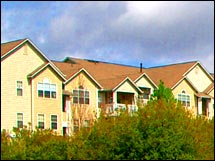Condo prices reveal housing trendsComparing condo prices may be the best way to gauge the direction of housing prices.NEW YORK (CNNMoney.com) -- In trying to get a read on how much real estate markets are slumping, some people may be looking at the wrong indicator. The National Association of Realtors (NAR) tracks sales of both single-family homes and condos.
Mortgage Rates
In the third quarter of 2005, NAR stats for single-family homes show that prices fell 1.2 percent from a year earlier, with 30 percent of markets showing declines. Condo prices not only dropped more steeply, 2.1 percent, but 46 percent of markets showed declines. Which gives a truer picture? Adam Koval, a former investment banker who now runs SocketSite.com, which covers San Francisco's real estate market, insists condos are the way to go. "Look at the same building six or eight months after the first sales were made," he says. "The prices then will be a pretty good indicator of what's going on." The reason: It's an apples-to-apples comparison. With condos, there's, "no adding floor space or big improvements," says Koval. If you see a price change, it's usually pure appreciation - or depreciation. Contrast that with single-family house stats. NAR prices, for example, do not account for the differences - especially the improvements - in homes. New houses, for example, have grown much larger, to an average of about 2,400 square feet from 1,500 in 1970. To be more accurate, you'd have to see what the same houses sell for at different times. An index constructed by the Office of Federal Housing Enterprise Oversight (OFHEO) index does compare same-home sales, but it doesn't account for investment in that home, say a big remodeling project. Other shortcomings: The OFHEO data doesn't do a good job capturing luxury home sales, because they track only transactions with conforming mortgage loans, which are limited to $417,000 for most of the nation. And it does capture values listed in refinancings, which are based only on appraisals. Why condo prices are so useful Chief economist for the Mortgage Bankers Association, Doug Duncan, says there are several reasons why condo prices are more accurate. "A smaller percentage of people who own condos occupy them; many are bought as second homes and for investment purposes," he says. "There's less friction in that market; it's more liquid." More condo sellers react to market changes and act quicker than owners of single family homes, who tend to hang onto property in the face of lower prices. Single-family house owners act like buy-and-hold value stock investors, riding out market peaks and valleys. They sell when they go through a life change - raising a family, retiring or moving for a new job, for example. Condo owners act more like growth stock investors, who bet on the hottest companies and trade in and out of stocks much more often, reacting to what they perceive is happening in the market. In looking back over the historical data of when the national housing market peaked, Duncan pinpointed July 2005 as the top. He also found it was the first month in four years that condo price appreciation was less than that of existing single-family houses. Of course, condo stats have their own imperfections. Jonathan Miller, of the New York appraisal firm, Miller Samuels, says when markets slump, the mix of apartment sales changes. The best condos - ones with great views or the finest features and amenities - make up a larger proportion of the total number of sales, skewing the median prices upwards and making the market look stronger than it actually is. The less expensive, cookie-cutter condos, languish on the market and are not included in the statistics. Too, condo developers, like their counterparts among single-family house builders, will offer inducements to buyers that, effectively, lower condo prices without showing up in the stats. Miller argues that the condo market is too different from the rest of the housing market to be a viable stand-in for it. He says, "Because of the investor component, condo prices show more volatility." For others, of course, that's what makes them compelling as indicators Even though condo prices may be a useful indicator of housing prices, nobody has really attempted to create a national same-condo sale index. The only national figures seem to be from NAR and those, like their single-family house prices, are median prices. And there's little historical data; the organization started reporting condo data only a few quarters ago Despite the caveats, it may be very useful to take a close look at NAR condo price stats when they come out in mid-February, even if you're more interested in single-family houses; the condo stats may tell you where prices are going in your town |
|

